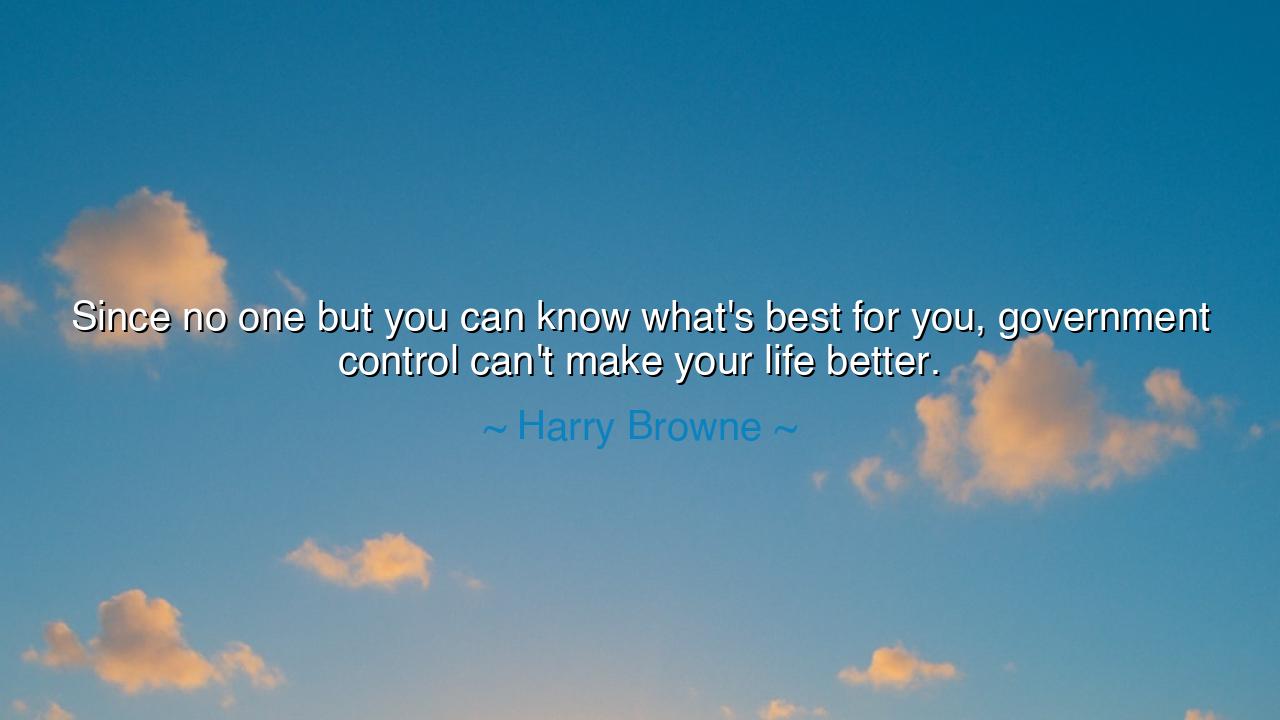
Since no one but you can know what's best for you, government
Since no one but you can know what's best for you, government control can't make your life better.






In a time when the power of governments grew vast and the voices of individuals seemed faint, the American philosopher and libertarian Harry Browne spoke words of enduring truth:
"Since no one but you can know what's best for you, government control can't make your life better."
These words, though simple in form, strike at the very heart of human freedom. Browne, who dedicated his life to the cause of personal liberty, understood that the soul of man is not designed for chains — even chains forged from good intentions. His wisdom reminds us that each human being carries within them a spark of divine reason, a compass that points toward their own path of happiness. No ruler, no bureaucrat, no institution can ever truly know the desires that move a single heart. Thus, every attempt by the state to command the private life of its citizens is an act of blindness — well-meaning perhaps, but doomed to fail.
The meaning of his words runs deeper than politics; it touches the very essence of individuality. Every person is born with a unique mind, a set of dreams and fears that cannot be measured or managed by another. When government control expands too far — when it decides what people must buy, how they must live, what they may say or think — it claims a knowledge that it does not possess. It replaces the wisdom of a thousand living minds with the single, rigid will of authority. Browne’s insight is not rebellion for its own sake; it is the defense of the sacred truth that freedom is the condition in which the human spirit can flourish. Without freedom, the soul withers; without choice, virtue becomes obedience rather than understanding.
The origin of Browne’s conviction lies in the traditions of both reason and rebellion. Born in the twentieth century, he witnessed the vast machinery of the modern state — the rise of totalitarian regimes that promised prosperity but delivered poverty, safety but demanded submission. He saw how governments, in their desire to plan and control, often suffocated the very people they sought to protect. The lessons of history were clear to him: when men trade freedom for control, they gain neither comfort nor dignity. His philosophy echoed that of the ancient Stoics and Enlightenment thinkers — that happiness cannot be given; it must be chosen, and choice requires liberty.
Consider the great tragedy of the Soviet Union — a nation that sought to build a utopia by managing every aspect of its citizens’ lives. The government promised equality and security, yet it robbed millions of their autonomy, their dreams, and even their lives. Factories produced what planners demanded, not what people needed. Art became propaganda, and innovation withered under the weight of fear. All was controlled, and yet all decayed. In the end, the people themselves rose up, not for wealth, but for freedom — for the right to think, speak, and live according to their own truth. Their story is the living testament to Browne’s wisdom: no system, no ruler, can replace the knowledge and will of the individual heart.
Yet Browne’s teaching is not a rejection of society, nor a call to chaos. It is a reminder of balance — that governments may build roads and defend borders, but they cannot build happiness. Only the individual, guided by conscience and reason, can do that. When freedom is preserved, creativity blooms, families thrive, and innovation turns the wheel of progress. When control is imposed, even in the name of good, progress halts and the human soul turns inward in despair. The measure of a just government, therefore, is not how much it directs, but how well it allows its people to direct themselves.
Browne’s words also speak to our personal lives. Each of us must guard our autonomy as a sacred gift. It is easy to surrender responsibility — to let others decide what we should think, whom we should trust, how we should live. But the cost of such surrender is the loss of self. To live freely is to accept the burden of choice — to make mistakes, to learn, to grow. Browne’s philosophy calls us not to fear freedom’s risks, but to embrace its rewards. For in the end, the liberty to choose one’s path is not merely a right; it is the very foundation of meaning and purpose.
So let this teaching be carried forward as a lamp for future generations: Freedom is wisdom in action. Guard it as you would your life, for it is the breath of the soul. Do not seek salvation in the arms of authority, nor expect government to give you what only courage can claim. Live as the ancients advised — as the master of your own mind and the steward of your own destiny.
Thus ends the teaching: no ruler, however noble, can know your heart; no law, however just, can replace your will. Trust in your reason, guard your freedom, and live with the dignity of one who knows that only through self-rule can the spirit of man remain truly alive.






AAdministratorAdministrator
Welcome, honored guests. Please leave a comment, we will respond soon